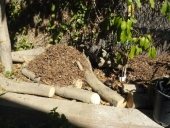




"It takes time to save time"
 1
1




Moderator, Treatment Free Beekeepers group on Facebook.
https://www.facebook.com/groups/treatmentfreebeekeepers/









"It takes time to save time"
 1
1




Michael Cox wrote:
spent mushroom castings are fairly nutrient poor




"It takes time to save time"
 1
1




Bruce Drukker wrote: Any thoughts on the ratios?
 1
1




Moderator, Treatment Free Beekeepers group on Facebook.
https://www.facebook.com/groups/treatmentfreebeekeepers/





 1
1




Medicinal herbs, kitchen herbs, perennial edibles and berries: https://mountainherbs.net/ grown in the Blue Mountains, Australia




John Elliott wrote:
Bruce Drukker wrote: Any thoughts on the ratios?
If your wheelbarrow is 4 cu. ft., that's 30 gallons, so maybe a gallon of biochar per wheelbarrow load? I'd go heavier on the mushroom compost, maybe 5 gallons of it in a wheelbarrow load.*
*Disclaimer: Not an exact science, your mileage may vary, all biochars are not created equal, offer not good in AK or HI.
"It takes time to save time"




Michael Cox wrote:Sounds like you are on the right track - although neither biochar, nor mushroom casings are providing nutrients in this scenario. As far as improving tilth goes, I'd aim to do small areas really well to begin with and work outwards in later years as you get more materials.

"It takes time to save time"




Angelika Maier wrote:I use mushroom too but must pay for it. I think there are concerns (but I still use it). Mushrooms are grown on horse manure and before that
the manure is sterilized with some chemical nasty - don't ask me which.
"It takes time to save time"
 1
1




Bruce Drukker wrote:
Well, I read somewhere on this forum that it was mercury. This is what raised my initial concern. I'm hoping the biochar will help with that.
 1
1




Medicinal herbs, kitchen herbs, perennial edibles and berries: https://mountainherbs.net/ grown in the Blue Mountains, Australia




Milo Jones wrote:
Bruce Drukker wrote:
Well, I read somewhere on this forum that it was mercury. This is what raised my initial concern. I'm hoping the biochar will help with that.
There is no mercury involved in commercial mushroom production. When I worked in the industry 30 years ago the only sterilization involved was a 6 hour steam treatment to bring the substrate to 160 degrees F before cooling and inoculation.
"It takes time to save time"




Milo Jones wrote:
Bruce Drukker wrote:
Well, I read somewhere on this forum that it was mercury. This is what raised my initial concern. I'm hoping the biochar will help with that.
There is no mercury involved in commercial mushroom production. When I worked in the industry 30 years ago the only sterilization involved was a 6 hour steam treatment to bring the substrate to 160 degrees F before cooling and inoculation.
 1
1




Bruce Drukker wrote:My soil is decomposed granite which drains incredibly fast. To counter this, I'll be building some hugel beds, but rather than pile the wood on the surface, I'll be burying it a couple of feet deep. Before backfilling however, I would like enrich the DG with some organic matter. I have an unlimited supply of free "Spent Mushroom Substrate" or mushroom compost as some people call it from a local producer. I would also like to add some biochar to this mix. Is there anything nefarious about SMS? The supplier is not organic, but the list of ingredients seems fairly innocuous. Also, I am not sure what the ratio of DG to SMS should be. I generally use 5 gal. buckets and dump them in a wheelbarrow for mixing. I would like to premix the compost with bio char before adding it to the DG, so a ratio of BC to SMS would be helpful also. Thanks for reading!




Jan Tucker wrote:
Hi Bruce, I've been getting my spent substrate from a similar place in Escondido, but I live in Temecula. Would you mind sharing the info about the Fallbrook farm? I heard from a Meetup member of mine that there was a farm in Fallbrook but she didn't have the info on it.
"It takes time to save time"




Jan Tucker wrote:
Milo Jones wrote:
Bruce Drukker wrote:
Well, I read somewhere on this forum that it was mercury. This is what raised my initial concern. I'm hoping the biochar will help with that.
There is no mercury involved in commercial mushroom production. When I worked in the industry 30 years ago the only sterilization involved was a 6 hour steam treatment to bring the substrate to 160 degrees F before cooling and inoculation.
Hi Milo, I am new here. I'm wondering if you checked any of the farms out lately. So many new chemicals have been introduced into farming recently. Chemical production and use, itself, has mushroomed in the last few decades (pun intended). Do you think they could be using more chemicals these days?
I also read here about some other concerns: high salt, may contain pesticide residues, and not finished composting (which we know) http://www.compostjunkie.com/spent-mushroom-compost.html












Medicinal herbs, kitchen herbs, perennial edibles and berries: https://mountainherbs.net/ grown in the Blue Mountains, Australia




"It takes time to save time"

|
Give a man a gun and he'll rob a bank. Give a man a bank and he'll rob everyone. Even tiny ads:
the permaculture bootcamp in winter (plus half-assed holidays)
https://permies.com/t/149839/permaculture-projects/permaculture-bootcamp-winter-assed-holidays
|
